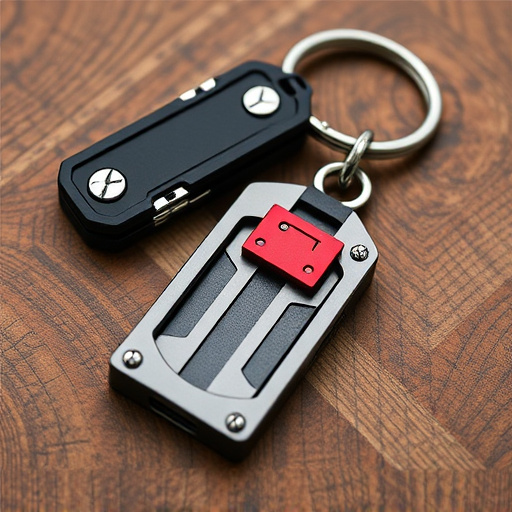When crafting an impact-resistant keychain weapon for personal safety, prioritize high-grade stainless steel or titanium for durability and strength. Alternatively, advanced composite materials like fiberglass or CFRP offer lightweight yet robust designs with superior strength-to-weight ratios. These modern options enhance reliability and enable more compact, ergonomic weapon designs. Consider material pros and cons: steel for strength but potential weight and rust issues; aluminum for balance between strength and lightness; and titanium for exceptional strength, low density, and excellent corrosion resistance at a higher cost.
In today’s world, personal safety is paramount. For those seeking a discreet yet effective self-defense tool, concealed keychain weapons offer a compelling solution. This comprehensive guide explores the essence of impact-resistant keychain weapon materials, from durable steel and lightweight aluminum to the strength of titanium. We navigate design intricacies ensuring compactness and ease of use while adhering to legal considerations. Learn best practices for safe storage and responsible ownership to empower yourself with this valuable personal defense resource.
- Choosing the Right Materials for Your Keychain Weapon
- – Discussing the importance of durable and impact-resistant materials
- – Highlighting common options like steel, aluminum, and titanium, their strengths and weaknesses
Choosing the Right Materials for Your Keychain Weapon
When crafting a concealed keychain weapon for personal protection, selecting the appropriate materials is paramount to ensure effectiveness and reliability. Opting for impact-resistant options is crucial for withstanding the stresses of everyday carry and potential self-defense scenarios. High-quality metals like stainless steel or titanium are excellent choices as they offer superior durability and corrosion resistance. These materials can withstand impacts and rough handling, ensuring your keychain weapon maintains its integrity over time.
Additionally, considering advanced composite materials enhances both strength and lightweight properties. Fiberglass or carbon fiber reinforced polymer (CFRP) can provide exceptional impact resistance while significantly reducing the overall weight, making it easier to carry discreetly. Such modern materials are not only durable but also offer unique design possibilities, allowing for more compact and ergonomically designed keychain weapons.
– Discussing the importance of durable and impact-resistant materials
When designing a concealed keychain weapon for personal protection, choosing durable and impact-resistant materials is paramount. These materials ensure the device can withstand the rigors of everyday carry and unexpected situations alike. High-quality metal alloys, such as steel or titanium, offer superior strength and resistance to dents and cracks, crucial for a reliable self-defense tool.
The ability to maintain integrity under impact is especially important for a keychain weapon’s effectiveness. Impact-resistant materials prevent the device from failing during critical moments, ensuring its ability to deliver a powerful strike. This durability also extends to the weapon’s overall lifespan, making it a practical and long-lasting addition to personal safety measures.
– Highlighting common options like steel, aluminum, and titanium, their strengths and weaknesses
When choosing materials for a concealed keychain weapon, understanding the pros and cons of common options is essential for personal protection. Steel, known for its strength and durability, offers superior edge retention and is impact resistant, making it an excellent choice for close-quarters defense. However, steel can be heavier, potentially affecting the overall portability of your keychain weapon, and may require more maintenance to prevent rusting.
Aluminum, lighter in weight, provides good balance between strength and lightness, making it ideal for those seeking a more discreet self-defense option. It is highly corrosion-resistant and offers decent impact resistance. Yet, aluminum might not be as tough as steel when facing severe impacts or prolonged use. Titanium, the premium choice, combines exceptional strength with low density and excellent corrosion resistance. Titanium keychain weapons are durable and lightweight but can be pricier than their counterparts.
When selecting an impact-resistant keychain weapon, prioritizing durable materials is key for personal safety. Options like steel offer superior strength, while aluminum and titanium provide lightweight protection. Consider your needs and environment to choose the best material for your concealed keychain defense system. Remember, preparation is key; equip yourself with a reliable, well-crafted tool designed for self-defense.
